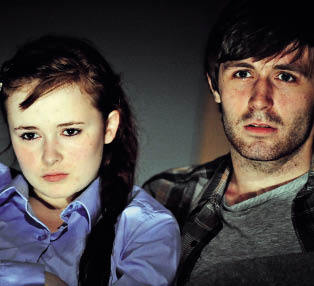Spur of the Moment
Royal Court, until 21 August
The Beauty Queen of Leenane
Young Vic, until 21 August
Henry IV Part 2
Shakespeare’s Globe, until 3 October
It used to be policemen, now playwrights are getting younger too. Spur of the Moment is a debut work by Anya Reiss, who hasn’t left the sixth form yet. Her play takes us into a nice middle-class home where wars over money and sex are raging. Dad has blundered at work. An office fling has earned him the sack, left him in debt and turned his wife into a cauldron of jealousy. The family has taken in a lodger, Daniel, a wan and handsome 21-year-old student. Mum flirts aggressively with him, hoping to inflict some retaliatory scars on her faithless husband, but Daniel is taken by the couple’s gorgeous and precocious 12-year-old daughter, Delilah. She blurts out her love for him and he responds with an impetuous kiss which she mistakes for long-term commitment (she’s only 12, after all). She starts boasting mysteriously about ‘my boyfriend’. When Daniel’s girlfriend arrives the real sparks start to fly. The encounters between the rivals are laced with rich doses of girl-on-girl arsenic.
There is an amazing maturity about this debut. Reiss uses the age-of-consent taboo to create a compelling family drama which also neatly contrasts the rancid, mistrustful love of middle age with the rushed and excited fumblings of youth. Not everything is quite right. Towards the end the characters become a bit repetitive, and their emotional range might be broader. And the play’s closing moments seem a tad petty compared with the Wagnerian grandeurs that preceded them. That said, Reiss is a genuine discovery.
The character of Daniel, drawn in oblique and subtle shades, is her outstanding achievement. An emotional drifter who can’t make sense of his violent inclinations, Daniel is also, rather strangely but very convincingly, victimised by his dreamy good looks. That this authentic portrait of a mixed-up twenty-something male has been achieved by a girl of just 17 is a miracle which makes one want to cheer. Slightly less heartening is Reiss’s CV which reveals that she is ‘studying A-levels’. What for? Presumably to gain entry to the debt-swamp of university. This seems a weird choice for a teenager who, almost alone of her generation, has a theatrical career ready and waiting for her. Skip the degree. You’ve made it. Just write.
In the last half-century, the west of Ireland has inspired an entirely new dramatic genre, ‘get-de-feck-out theatre’. These punishing plays follow the attempts of husbandless virgins to escape their homeland and start a bounteous new life overseas. Three details are guaranteed. Ireland’s insularity and meanness will be vastly exaggerated. The first act will end with a cross-eyed mentally subnormal hunchbacked orphan called ‘pawr oul Billy’, drowning himself in the weir. The play will close with three wrinkled biddies climbing on to the kitchen table and dancing through their tears, while a fourth biddy smiles wisely and boils some potatoes.
Martin McDonagh sits bang in the middle of this tradition but his 1996 play The Beauty Queen of Leenane is untainted by the false sentiment and cloying sweetness that affect most G-D-F-O plays. He arranges his canvas with delicious narrowness by focusing on a half-crippled grandmother, Mag, and her frustrated 40-year-old daughter, Maureen. They live, and hate, in total isolation. Old Mag rocks on her chair, bullying, mocking and manipulating her wretched daughter, destroying letters from suitors and tossing invitations to dances in the fire. In return, Maureen tortures Mag with pans of boiling chip fat. Despite her mother’s sabotage attempts, Maureen makes a connection with a charming builder, Pato Dooley. He has everything a rural skivvy looks for in a man: a job. But he’s based in London so their relationship, and Maureen’s chances of freedom, are haunted by terrible uncertainties. Like a great crime writer, McDonagh keeps the audience in agonies of suspense until the very last moment. It’s relentlessly gruesome but also wildly funny. Joe Hill-Gibbons’s production is lit up by Susan Lynch’s performance as Maureen (though she’s too young and pretty to play ‘40 and plain’) and by Rosaleen Linehan as the twinkly-eyed granny, whose veins flow with pure poison.
Over at the Globe, Roger Allam is playing Falstaff and doing so rather wonderfully by dispensing with Falstaff. Rather than painting a portrait of scrofulous squalor he brings out the courtliness and elegance of the cowardly knight. The hair is dark, the belly modest, the face youthful and unlined. The thick beard is neatly combed and offers no asylum to weevils or stray bacon rinds. Being younger than most recent Falstaffs, he can indulge the character’s ribald, bottom-pinching sexuality without making the audience feel creepy. One need hardly add that he speaks the verse exquisitely. When Falstaff is off stage the play wilts a little but this is not Allam’s fault. It’s Shakespeare’s.







Comments